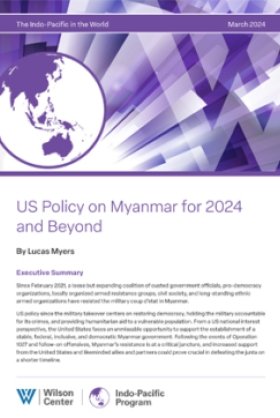Reform, Accountability, and the Future of Nigerian Federalism (VIDEO)
A forum with Orji Uzor Kalu, Governor of Abia State, Nigeria and 2007 presidential candidate. Watch the video.
Overview
Orji Uzor Kalu, Governor of Abia State, Nigeria and 2007 presidential candidate
Moderator: Howard Wolpe, Director, WWICS Africa Program
In anticipation of the 2007 general elections in Nigeria, the Woodrow Wilson Center's Africa Program hosted presidential candidate Orji Uzor Kalu, governor of the state of Abia in Nigeria. Kalu discussed Nigeria's historical, social, and political legacies, offered a critique of the current Nigerian government, and presented his vision for Nigeria if elected president.
Kalu argued that Nigeria's current political and economic challenges originate, in large part, from its troubled past. Created as a federation of states by the British colonial power, Nigeria was an artificial attempt to form a nation from an extremely heterogeneous population of approximately 250 ethnic groups. Its history has been fraught by coups, constitutional changes, and corruption, which have taken a heavy toll on the rule of law in the country.
Even the latest 1999 constitution has been abused by the current regime, which has sought to undermine Nigeria's federal structure by centralizing power and authority at the national level, according to Kalu. The rise of insurgent groups in the Niger Delta and elsewhere in the country is largely in response to the centralization of power. Nigeria's federalism is vital for its peaceful and democratic existence. States must be given greater policing authorities and resources, in accordance with the constitution.
Corruption has also been a major obstacle to Nigeria's stability and economic development. Kalu asserted that President Obasanjo's fight against corruption—through the 2001 anti-corruption law and the formation of the Independent Corruption Practices Commission (ICPC)—has been irresolute and selective. It has focused on lower-level corruption, while depriving anti-corruption mechanisms of investigative independence; using corruption allegations to subdue political opposition; and allowing governmental corruption to persist. Citing his record on corruption as governor of the Abia State, Kalu pointed out that Abia was the first state to form an anti-corruption body and that he has sought to instill values of integrity and commitment within his administration and state law enforcement agencies.
Kalu commended President Obasanjo's advisors for creating a political reform package that has begun to show results. He also applauded the administration's successful attainment of debt relief from the Paris Club and other international donors. Still, he claimed, much remains to be done in order to promote Nigerian economic development and improve the well-being of ordinary Nigerians. Electricity is the key to economic progress and prosperity, because without it small- and medium-size businesses—the engines of economic growth—cannot survive.
Nigeria's increased involvement in peacekeeping initiatives throughout Africa was also praised by Mr. Kalu, who suggested that Nigeria can do more to alleviate conditions in Zimbabwe.
Turning to Nigeria's upcoming elections, Mr. Kalu warned that the widespread rigging that prevailed in the 2003 elections but were overlooked in the interest of stability must not occur again in 2007. The legitimacy and fairness of the 2007 elections will be vital for the future of democracy in Nigeria.
"My vision is to transform Nigeria and make it a global power," Mr. Kalu stated as he discussed his agenda for Nigeria. By utilizing domestic natural gas, he promised to solve Nigeria's electricity problems within eighteen months of being in office, thus fueling local markets and increasing national competitiveness. He would also defuse ethnic tensions in the Niger Delta through a more fair distribution of national wealth and the local refinement of domestic oil. His political agenda would emphasize reforming the judiciary and reestablishing a more balanced power relationship between the federal government and the states.
Many of the audience's questions centered on Kalu's plans for Nigeria. He was asked to clarify his position on the role that ethnic origin should play in electing the new president of Nigeria. While acknowledging that competence is more important than the ethnic origins of presidential candidates, Kalu argued that a system of rotation should be in place for the next few decades, during which time ethnic tensions would be assuaged. Kalu suggested that in the 2007 elections only Ibo candidates should run for presidential elections, since they conceded the presidency to President Obasanjo in the past and have traditionally been deprived from leadership positions in Nigeria. When asked about the federal model that he envisions, he remarked that although some federal laws should override state laws, states should be granted substantial freedoms to legislate in a manner that reflect the culture and traditions of their local population.
Amir Stepak, Research Consultant
Howard Wolpe, Director
Hosted By

Africa Program
The Africa Program works to address the most critical issues facing Africa and US-Africa relations, build mutually beneficial US-Africa relations, and enhance knowledge and understanding about Africa in the United States. The Program achieves its mission through in-depth research and analyses, public discussion, working groups, and briefings that bring together policymakers, practitioners, and subject matter experts to analyze and offer practical options for tackling key challenges in Africa and in US-Africa relations. Read more
Thank you for your interest in this event. Please send any feedback or questions to our Events staff.









